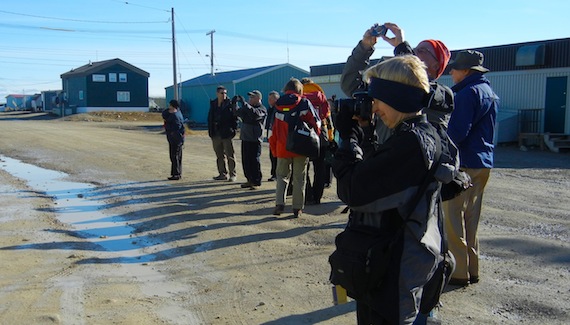Arctic cruise operators promote new guidelines for passengers, communities
If you’re planning to embark on an Arctic cruise or if you live in a community where these cruise ships stop during the summer, you’ll want to look at new guidelines developed by the Association of Arctic Expedition Cruise Operators.
Working with five Arctic tourism associations, the Association of Arctic Expedition Cruise Operators, which promotes best practices among most of the major expedition cruise operators, has produced two sets of suggested guidelines—one for cruise ship visitors and another for host communities.
The aim: to help operators and visitors behave responsibly and ensure everyone benefits from cruise ship tourism.

The guidelines for visitors include a reminder to “remember that you have left home to gain new experiences and insight into the lives of others.”
“It’s important not to judge other cultures based one one’s own sense of reality, norms and values. Make an effort to understand and respect the idea that cultures can be different.”
Among the other points raised is how “a large group of visitors can easily impact everyday life in small communities, so please be aware of your surroundings.”
“If you are part of such a group, consider how you can contribute to the best possible interaction, for example, by avoiding blocking roads, entrances and exits.”
The guidelines also include simple—and you might think, self-evident—“rules” on how to behave such as:
• talk to, and not about, the people you meet;
• think of yourself as an ambassador for your country and culture, as the locals are for theirs. “Politeness and good manners are always appreciated;”
• if at all possible, use toilets for human waste;
• never enter a private house without an invitation; and,
• do not walk on graves.
The Association of Arctic Expedition Cruise Operator project also wants to make it easier for communities to share their knowledge with tour operators.
So, there’s a template that communities can use to give visitors the practical information that they want to provide about their communities as well as guidelines for how they want people to behave when visiting.
An online template shows information for a fictitious place called “Nice Inlet”—“Nice Inlet has its name from being a very beautiful location with rich nature resources and a safe-haven for sailors.”
“Findings of cultural remains show that there were people living in this area more than 10,000 years ago. The place was coincidently rediscovered by Captain Joe Kingly. In an attempt to circumnavigate the Arctic, his vessel Aurora was caught in a bad storm and forced to change course and find a safe haven…”
You can find the guidelines for cruise ship passengers here and those for communities, including the template for community information sheets, here.